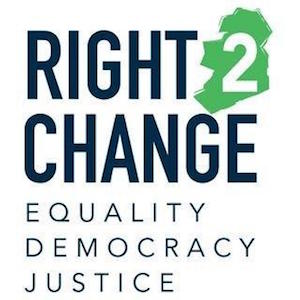
A weak and largely negative response by socialists and social democrats to a vote transfer pact with other progressive election candidates could have opened the door to a further five years of right-wing government in Dublin.
Trade union leaders had urged all those who signed up to the Right2Water anti-water charge campaign to transfer to other affiliates of the group, now known as ‘Right2Change’.
The group included a broad coalition of trade unions, civil society organisations, Sinn Fein, progressive political parties and independents stemming from the Right2Water movement. They had drawn-up a range of left-leaning policies which they hoped would be implemented by the next government in Dublin.
But so far the reaction from groups such as the Anti-Austerity Alliance has been broadly hostile.
The former Socialist Party leader, Joe Higgins TD, raised the old shibboleth of sectarian divisions in the North, which he argued Sinn Fein had failed to address.
His colleague in the Anti-Austerity Alliance, Ruth Coppinger, said her organisation would not agree to forming a government with Sinn Fein, even if the numbers allowed, because of austerity cutbacks in the North. She claimed the Right2Change campaign had become a “prop” for Sinn Fein. Her colleague Paul Murphy, the Socialist Dublin South-West deputy, blankly said he would not participate.
The Social Democrats, the new ‘left of centre’ party formed by TDs Roisin Shortall, Catherine Murphy and Stephen Donnelly, also declined to sign up to the new progressive platform.
Independent TDs such as Clare Daly and Mick Wallace have indicated their inclusion, although Donegal independent Peter Pringle said he was concerned that Sinn Fein could be using it to “maximise its vote”.
The chaotic nature of the responses was good news for the Labour leader, once the standard bearer of the Irish left. Labour leader Joan Burton claimed the political alliance between Sinn Fein and left-wing parties and Independents was “over before it began”.
“It sounds a bit as though before the parties even got to the altar they kind of fell out, maybe before they even got into the church,” she said.
Republicans have condemned those who opted for an isolationist strategy.
Sinn Fein deputy leader Mary Lou McDonald said it was “unforgivable” for left-wing groups not to grasp the opportunity of the broad policy platform and transfer pact.
“I can only speak for Sinn Fein,” Mary Lou McDonald said. “Others now need to do likewise but let me reiterate. There is an expectation and an appetite that is unmissable amongst communities right across this State who want those of us who have argued so strongly against austerity, who have argued investment, who have argued for relief for low and middle income families.
“There is an expectation on all of us to do things and actually make that happen. We await the response of others but I would say it would be unforgivable, literally unforgivable, to miss an opportunity such as this.”
She said the “driving impulse for this, in the first instance, is about the alternative politics we have been talking about and advocating over the course of the current Dail”.
“We believe there is a great opportunity in the forthcoming election. We believe we need an alternative and a progressive government.
“Sinn Fein wants to be part of that and we believed that parties and candidates who share that platform and agree on these principles should, while attending to their own election campaigns, should equally encourage people to transfer to other like minded candidates.”
“For people who have been devastated by austerity, for people who have been alienated from the political process, they are not really interested in small, petty squabbles,” Ms McDonald added.
“What they are interested in is the big idea, and the big opportunity for change and arguably we have never had the opportunity that presents itself now because it is not just Sinn Fein and other political parties and Independents.”
Right2Change spokesperson, David Gibney of the Mandate trade union, said the process was focused on “concentrating on policy rather than parties,” Mr Gibney said. “Trying to get people to think about human rights based policies ... that’s how this document has come about.”
“We began this process by concentrating on policy rather than parties, and trying to get people to think about human rights based policies .... and that’s how the policy document has come about.”
![[Irish Republican News]](https://republican-news.org/graphics/title_gifs/rn.gif)
![[Irish Republican News]](https://republican-news.org/graphics/title_gifs/harp.gif)

